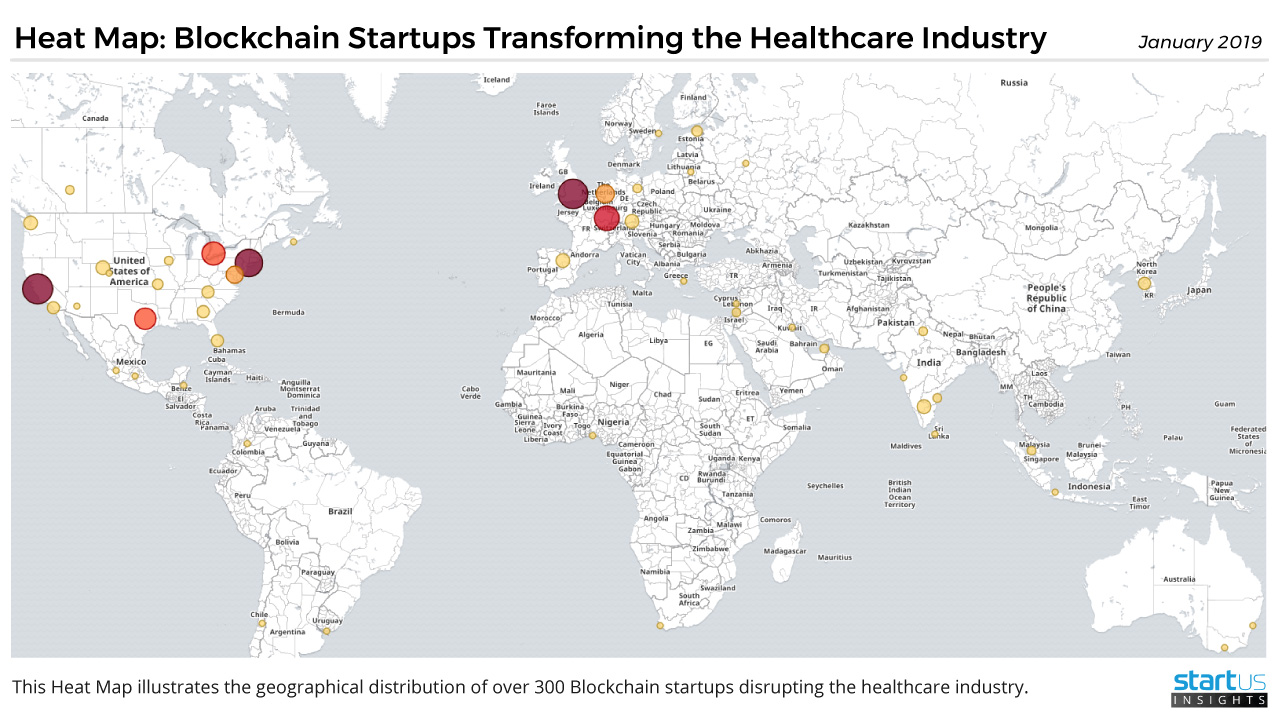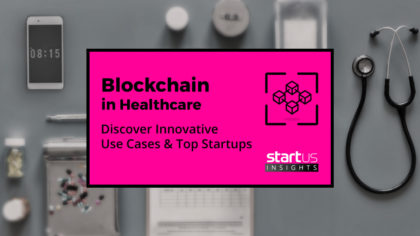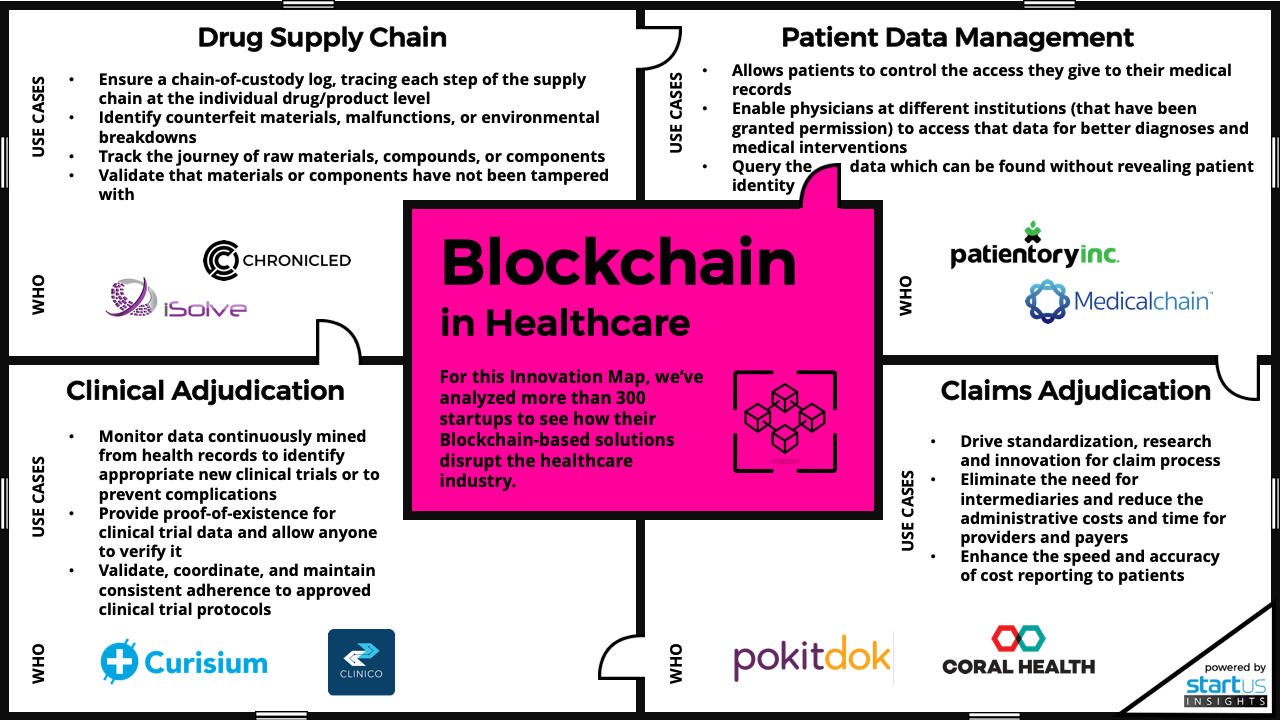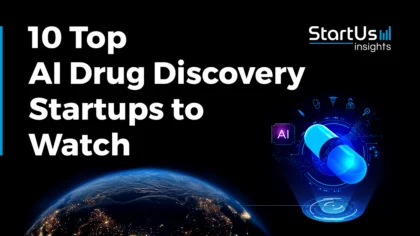Key Takeaways
Here are our key takeaways of how blockchain impacts the healthcare industry:
- Patient Data Management – Gives patients full data ownership over their medical records.
- Clinical Adjudication – Supports in the validation, coordination, and maintenance of consistent adherence to approved clinical trial protocols.
- Claims Adjudication – Offers clear and transparent communication of patient billing through smart contracts that do not lead to overbilling the patient.
- Drug Supply Chain – Allows to reliably check a drug’s origin and manufacturing history thus identifying a counterfeit drug or prescription.
Heat Map: Blockchain Startups Disrupting The Healthcare Industry
Our team has created the Heat Map below to highlight the hotspots of blockchain startups disrupting the healthcare industry on a global level:

Click to enlarge
Global Distribution of Blockchain Startups in the Healthcare Sector © StartUs Insights
8 Blockchain Startups Disrupting The Healthcare Industry:
- Chronicled – The startup leverages blockchain and the Internet of Things (IoT) to power smart, secure supply chain solutions.
- Clinico – Builds a patient-centered clinical trial data-sharing community.
- Coral – Provides technology-based solutions to accelerate care delivery, automate multiparty administrative processes and improve health outcomes.
- Curisium – Tracks contract performance in real-time, and prospectively simulates alternatives.
- iSolve – Complements existing systems and processes to ensure data provenance and create an interoperable and high-performance environment focused on improving patient outcomes.
- Medicalchain – Utilizes blockchain technology to securely store health records.
- Patientory – A global population health management software giving users access to their health data.
- Pokitdok – Develops APIs for healthcare verticals such as claims, pharmacy and identity management. Their platform, DokChain, is a distributed network of transaction processors operating on both financial and clinical data across the healthcare industry.
The blockchain is already conquering the healthcare industry and helping it overcome its shortcomings by making medical care more customer-centric, personalized, pleasant to interact with and thus, much more effective in treating diseases and disabilities.
Blockchain in healthcare is a newly formed but large market that is expected to grow to $5.61 billion in size by 2025, maintaining double-digit growth along the way.
Innovation Map: How Blockchain Startups Transform The Healthcare Sector
Our team of innovation analysts scouted 300 blockchain startups and prepared a comprehensive overview of blockchain applications in the healthcare industry.
Below, you’ll find the Innovation Map highlighting the most promising application areas as well as a deep dive in each of the sections.
Patient Data Management
In terms of data management, the healthcare industry faces a multitude of challenges: from inefficient medical knowledge transfer to personalized medical care – blockchain supports professionals in handling these situations better.
One issue that is often criticized is the absence of full data ownership by a patient. Medical records can in theory be used and/or shared without the explicit consent of a patient. Blockchain addresses this issue by gathering patient data and storing it in an organization’s internal database.
The patient’s data access itself is governed by smart contracts and their respective rules. This way, a patient can share their medical records on their own terms. The data itself can be anonymized for research purposes or made completely transparent, depending on a patient’s needs.
Moreover, by adding specific rules to these smart contacts, a patient can also share their health data and sensor readings (e.g. from their smartwatch) with their doctor to make long-term treatment much more effective and personalized to achieve the best results.
Clinical Adjudication
Clinical trials are an essential part of any new medical product or drug. Currently, they represent a complex and long process that takes several years to complete and generates massive amounts of data.
The process itself is subjected to particular scrutiny as its results can either make or break a new drug or device. In doing so, it may also dismantle claims of manufacturers related to a drug’s/product’s capabilities and effects on the human body.
The verification capabilities of the blockchain technology ensure that any data stored on a shared ledger is both accessible by all stakeholders and can’t be tampered with – neither by the creator of the ledger nor by any third parties.
Claims Adjudication
The healthcare industry suffers from inefficiencies in patient billing, with an estimated 5-10% of all healthcare costs being deceptive due to overbilling and billing for services that were not provided. Claims adjudication, for instance, can be much more accurate and easier on the patient by automating the whole process via blockchain.
Claims themselves are usually written in sophisticated (legal) language perspective, potentially being subject to varying interpretation in court. When it comes to healthcare, this approach is inherently wrong, as the agreements tend to complicate the matter in order to be potentially defensible from a legal standpoint. Instead, they should focus on communicating the costs of healthcare services to a patient in a clear and transparent manner.
Blockchain-powered smart contracts are capable of resolving this issue. The agreements are written in code rather than legal language and thus leave no room for double interpretation. At the same time, smart contracts drive a standardization and research in the claim process.
Drug Supply Chain
Healthcare is in constant need of being able to track its supply chains in their entirety – from a supplier and their manufacturing facilities to the end consumer. A manufacturer marks a produced drug — generating a “hash” and uploading the information on the blockchain. Then, a wholesaler verifies the product via the ledger. Before selling it, a pharmacy worker can also verify the product provenance later on. Finally, a patient purchasing the drug can reliably check its origin and manufacturing history.
Identifying a counterfeit drug or prescription in a short amount of time not only helps drug producers/retailers financially but might actually save a patient’s life.
The scale of this problem is staggering, as the counterfeit drugs business has grown into a $75 billion industry itself. Initiatives such as the Ethereum-based MediLedger Project, backed by industry leaders such as Genentech and Pfizer, have already launched a medicine tracking solution, focusing on optimizing drug supply chains and eliminating counterfeit products.
Conclusion
Blockchain technology is already addressing many of the industry’s issues such as transforming the approach to patient ownership over their own health records, or supporting drug manufacturers and anyone involved in the sale and distribution of medical products to battle the black market, and automating as many processes as possible, which results in giving doctors and caregivers more time to focus on providing exceptional medical care, instead of getting bogged down by the industry’s operational bureaucracy.
The potential of blockchain in the healthcare market is immense. The current state of the industry requires much of its operational aspects to be reformed in order to keep up with the digital transformation.
Given the rapid development of this technology, it has become a necessity to stay informed of the most recent developments in the field to stay ahead of your competition.









